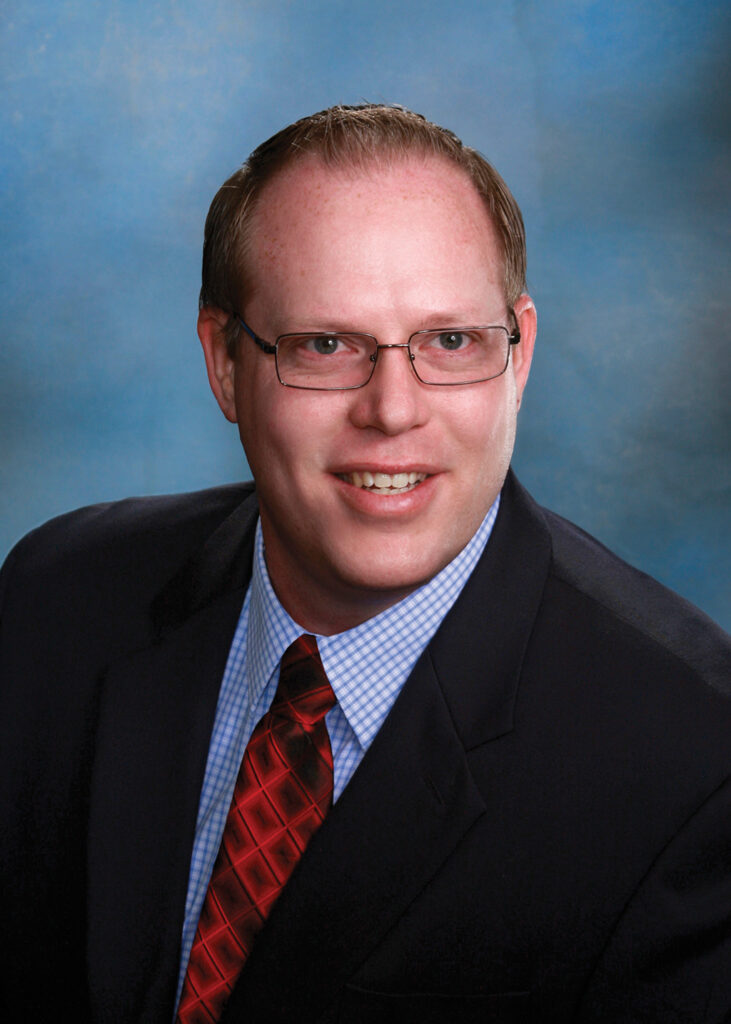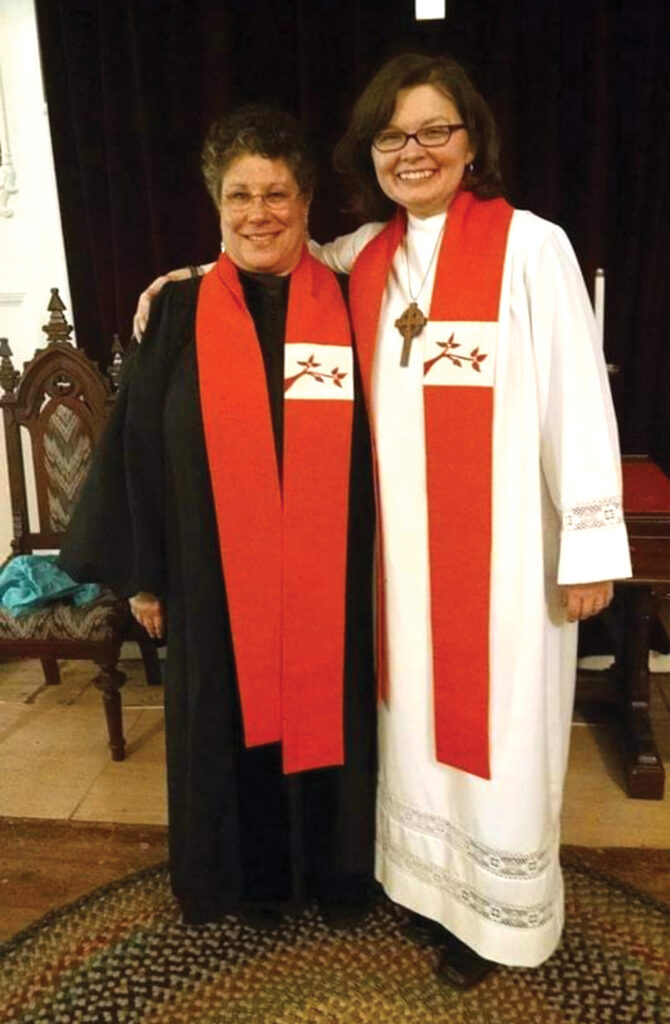Instilling Reverend John G. Fee’s “gospel of impartial love” into all Bereans is the true work of Berea’s Campus Christian Center (CCC). Serving people of various backgrounds, faiths and life experiences fosters the ability to live out this “gospel” in a practical way through lives of service, especially in the student chaplains it cultivates. Former CCC chaplains Philip Sutherland, M.D. ’05 and the Reverend Christina Cataldo ’02 found their way into the CCC in unique ways. Both were empowered by this “gospel” and continue to practice this spirit of service in their professional and private lives today.
Dr. Sutherland was raised as a Mennonite. He grew up with electricity and access to a phone and a car, but he did not have TV or radio, much less internet in his home. After high school, he worked at a storage company and as an emergency medical technician and volunteer firefighter. Around that time, his grandfather—a Baptist minister—took a group bus tour that stopped at Berea College. He encouraged Philip to look into attending the College.
“I had been out of high school four or five years at the time and hadn’t decided about college yet,” Sutherland said. “I was already working, and the work-study aspect at Berea was welcomed by me, and I applied.”

Sutherland became acquainted with his residence hall coordinator, who was also a student chaplain. “I was almost immediately aware of the Campus Christian Center and wanted to be involved,” he recalled. “I had a mixed concept of what Christianity was. Being involved in campus ministry was an opportunity for growth in faith and service and to get further training.”
After becoming a student chaplain, Sutherland reflected on some of his experiences. “Students asked if they could come talk to me. Sometimes it was about matters of faith, and sometimes they wanted to discuss personal problems,” he said. “It was a time of significant growth in my acceptance of other people, even if I didn’t share their beliefs. The grace of God is bigger than a particular denomination.”
During his time working with campus ministries, Sutherland considered attending medical school and had the opportunity to do a short-term service project in Haiti through a fellowship grant with the Campus Christian Center. He was in Haiti for a little more than two months, where he worked in a warehouse and assisted a doctor in the mountains treating patients without electricity.
The grace of God is bigger than a particular denomination.
Philip Sutherland
“That was a learning and growing experience for me as well—to be able to serve and be a blessing to them,” Sutherland said. “I got a lot out of it. It really planted a seed for what I wanted to do in the future.”
After earning a bachelor’s degree in biology at Berea, he graduated from the University of Tennessee Health Science Center College of Medicine in 2011. In 2014, Sutherland pursued fellowship training in advanced obstetrics at Médicos para la Familia in Memphis. Currently, he is the assistant director at Clínica Médicos, a clinic serving the Latinx community in Chattanooga, Tenn., which is among the city’s most underserved and vulnerable populations.
The clinic is bilingual, open seven days a week and treats patients with or without private insurance or Medicaid. No appointment is necessary. Offering “cradle-to-grave” care including obstetrics, contraceptives and diagnostic testing, Sutherland says the clinic tries to serve the community by offering 90 percent of medical services under one roof. The clinic receives 1,400 patient visits a month and delivers 200 babies per year while operating with a strong undercurrent of Christian values.
While Sutherland’s experiences in residential life and Berea’s Campus Christian Center helped pave the way to medical service work for him that embodies the true spirit of inclusive Christianity, Reverend Christina Cataldo found her own path into a career that allows her to continue to serve others today.
Cataldo first learned about Berea College as a high school student in Knoxville, Tenn., through the Upward Bound program. During her first year at Berea, her roommate and dear friend tragically passed away after an illness. They had been friends for some time before heading off to college, and Cataldo was devastated by the loss. She turned to staff and other students for comfort. The support she received was so valuable to her that she decided she wanted a bigger role on campus.
As a Christian and a pastor, I am committed to loving my neighbors.
Christina Cataldo ’02
“I wanted to be an RA (resident assistant) because of the great care I received when my great friend died,” Cataldo recalled. “They gave me overwhelming support. I didn’t expect all of what the school did to make sure I was OK. That’s why I wanted to become an RA. I wanted to give the care I had received.”
By working with fellow students, Cataldo got involved with the Campus Christian Center. She says they were just getting off the ground with student chaplains, and she had not considered a life in ministry work.
“I thought I was going to become a social worker,” she admitted. “I would’ve never imagined doing what I’m doing now because I grew up never seeing women in ministry except for televangelists on TV. When I was home I was still going to a church that doesn’t affirm women as clergy.”

Cataldo received an email invitation to meet representatives of seminary schools that would be in Berea to speak with students. She thought she had received the invitation by mistake and decided to talk with Rev. Dr. Loretta Reynolds, dean of the chapel, about it. She learned that there had been no mistake. Reynolds explained she had seen something in Cataldo that the student hadn’t seen in herself. That, along with working two summers in Washington, D.C., with a summer camp for poor youth, paved the way to divinity school.
Cataldo credits Berea with helping her earn a scholarship to Wake Forest University Divinity School in North Carolina. “Wake Forest saw Berea backing me up, and they respected the investment Berea had in me,” she said.
After her time at Berea, Cataldo came out as gay and met her wife, Dr. Tasha Dunn, in 2007 before same-sex marriage was legal in most places. She became the pastor at Winthrop Congregational Church, United Church of Christ in Maine in 2014, and continues her work in ministry and service there. She and her church serve the community by supporting the food pantry and working with a group that provides toiletries and other basic essentials to new immigrants and refugees.
Winthrop Congregational is Open and Affirming, a designation within the denomination intended to demonstrate the Christian faith by welcoming individuals of every race, ethnicity, nationality, gender, gender identity, sexual orientation, family structure, marital standing, socio-economic status, age and physical and mental ability to join in the ministry of the church. All are invited to participate in worship, fellowship and leadership.
Cataldo is very proud of her work with the Anti-Racism Resource Team committed to dismantling racism in all its forms as part of Christian practice.
“As a Christian and a pastor, I am committed to loving my neighbors,” she said. “We are all made of one blood, but our experiences vary greatly. I try to pay attention to the lived experiences of people whose lives are very different from mine, particularly in terms of their experiences with racism, to amplify their voices, and use my white privilege in service to my neighbors. My experience at Berea has been part of my foundation in this work.”

